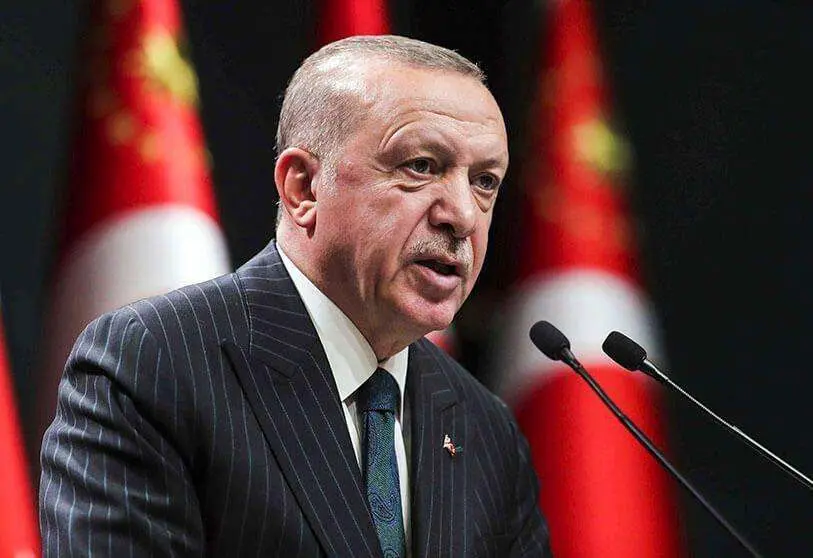Erdogan seriously threatens Greece

Turkish President Recep Tayyip Erdogan raised the tone on Saturday after warning Greece that it would pay a "heavy price" if it continues to "harass" Turkish aircraft in the Aegean Sea.
The Ottoman leader delivered a speech in the Black Sea environment in which he threatened Greece with harsh words: "Hello Greece, take a look at history. If you go any further, you will pay a heavy price", Erdogan said.
This Turkish warning comes in the context of the long-standing confrontation between Turkey and Greece over maritime borders and air borders, which has led both countries to be permanently vigilant in the area.
Turkey has been denounced by several countries such as Greece and Cyprus for allegedly violating its own maritime borders, including by ships prospecting for gas resources, with the Greek islands close to the Turkish coast being a hotspot in this tense scenario. The EU took a stand in this case on the Greek Cypriot side because of Turkish hostility.

Before this latest Turkish warning, Athens had already accused Ankara of violating its own airspace over the Greek islands. Meanwhile, Turkey points the finger at Greece for stationing troops on the Aegean islands in violation of peace treaties signed after World War I and World War II. Also, Mevlut Cavusoglu, Turkey's foreign minister, said his country would question Greek sovereignty over the islands if it continued to send soldiers there.
"We have only one word to say to Greece: don't forget Izmir (Smyrna in Greek)", Erdogan said, referring to the end of the Greek occupation after Turkish troops entered the Aegean enclave in 1922, as reported by the AFP news agency. All of this was part of the Turkish president's threatening speech.
"When the time comes, we will do whatever is necessary. As we say, we can come suddenly one night," added the Ottoman president, in what were worrying words for the Greek nation.
Relations with Cyprus are also tense, especially given the confrontation that led to Turkey's occupation of northern Cyprus in the mid-1970s and the establishment of the Turkish Republic of Northern Cyprus, which was only internationally recognised by the Eurasian nation itself.

Recep Tayyip Erdogan's threatening words should not be ignored, given that Turkey has already moved from words to action in other situations and scenarios, such as the war in Syria and the Syrian civil war.
Turkey entered Syrian territory across the border between the two nations, claiming to be in pursuit of Kurdish elements that Ankara has targeted as terrorists for allegedly carrying out attacks in southern Turkish territory. The Ottoman army has positioned itself in the north of Syrian territory, establishing a security strip in the context of the war being waged by the Syrian government led by President Bashar al-Assad, supported by Russia, against the opposition that seeks to overthrow the Syrian regime and which includes formations such as the Syrian Democratic Forces and Kurdish-Syrian elements, which in their day helped put an end to Daesh in Syrian territory with the help of the United States, a country that ended up abandoning the terrain, leaving the Kurdish-Syrian allies in the lurch and facilitating the occupation of territory by Russia, a major partner of the Al-Assad regime. The Syrian state argues that the continuation of the civil war is based on the objective of eliminating jihadist terrorist elements taking refuge in the last bastion of Idlib. Damascus also accused Ankara of employing jihadist mercenaries, who were sent to Syria to sow chaos in the territory.
Turkey also took part in the civil war in Libya by supporting the previous National Unity Government of Fayez al-Sarraj, based in Tripoli and supported by the UN and other nations such as Qatar and Italy, which confronted the Libyan National Army led by Marshal Khalifa Haftar and supported by nations such as Russia itself, the United Arab Emirates and France, and allied with the other Eastern Executive of Tobruk, which is in opposition to the Tripolitanian power. Various analysts have accused Turkey of sending mercenaries from Syria to Libya to support Al-Sarraj's militias in the context of a conflict that took on an international dimension due to the interest of various nations in Libya, given its geostrategic importance and oil reserves. The situation calmed down thanks to peace talks mediated by countries such as Morocco, which led to the appointment of a provisional government led by Prime Minister Adbul Hamid Dbeibé, very close to Turkey, who is now being questioned because the elections scheduled for last December, which sought to complete the democratic transition longed for since Muammar Gaddafi was overthrown in 2011, were not held. The latest political stalemate led the Tobruk parliament to appoint Fathi Bashagha as the new prime minister, considering that Dbeibé's time in power was over, something that the latter does not accept and which is causing tension and armed clashes around Tripoli, the Libyan capital, between Dbeibé's supporters and those of Bashagha.

All these scenarios raise concerns about Recep Tayyip Erdogan's words threatening Greece in the face of the territorial dispute in the border areas between the two countries around the Mediterranean Sea.








